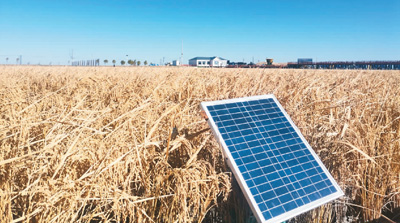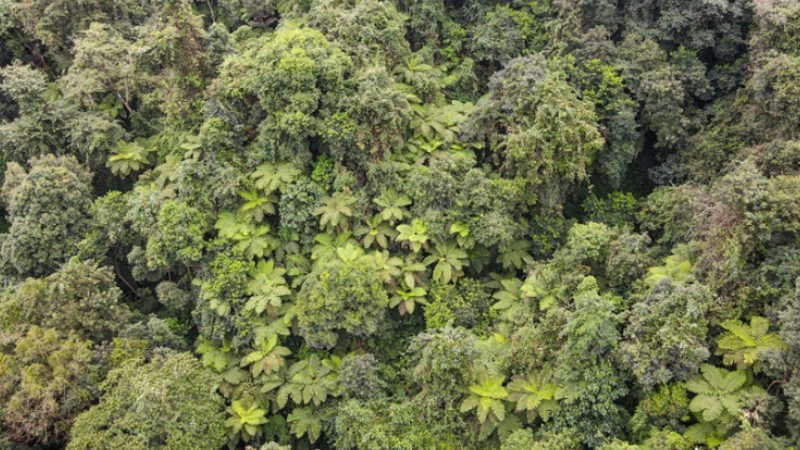Saline-alkali land transformed into fertile soil in NE China’s Jilin
In October, paddy fields in Taiping village of Da'an city, a county-level city administered by Baicheng city in northeast China's Jilin Province, were alive with the rumble of harvesters.
One year ago, the fields were nothing but a vast expanse of saline-alkali land with an average pH value of 9.31.
The west of Songnen Plain in northeast China is home to one of the world's three largest soda saline-alkali-soil areas, with over 45 million mu (3 million hectares) of saline-alkali land, including over 43.7 percent of heavily saline land.

Photo shows golden rice ears on the once-saline-alkali land in Haituo township, Da'an city, northeast China's Jilin Province. (People's Daily Overseas Edition/Wang Junling)
To ameliorate soda saline-alkali land in Songneng Plain, the first step is to lower the groundwater level below the critical depth, according to Wang Hongbin, a professor at the College of Resource and Environment of Jilin Agricultural University. Other measures include digging ditches to drain water and wash away salt with water, and using chemical amendments and planting saline-alkali tolerant crops to improve soil fertility.
At present, saline-alkali tolerant rice is a major option that combines ecological, economic and social benefits.
At the site of the saline-alkali test field project of Sinochem Environment Holdings Co., Ltd. (Sinochem Environment) located about 40 km from Taiping village, harvested rice were ready to be delivered.
"The rice yield per mu in the test fields has so far reached 300 to 350 kg," said Ge Yanjun, general manager assistant of a Jilin-based subsidiary of Sinochem Environment.
After transforming saline-alkali land, continuous efforts need to be made to turn saline-alkali land into high-standard farmland.
"Take the irrigation system for example. We use smart drainage valves equipped with solar panels, along with flow monitors in ditches. Sensors upload data including the pH value, pressure, water level, and water temperature every 10 minutes," Ge said.
Ge added that the latest intelligent equipment including unmanned tractors, crop protection drones, transplanters and harvesters are used in the test fields for sustained and efficient management.
Meanwhile, research in areas like developing saline-alkali tolerant rice varieties, innovation in cultivation techniques, and intelligent monitoring continues.
Ma Wei, associate researcher at the rice research institute under the Jilin Academy of Agricultural Sciences, said that turning saline-alkali land into black soil requires improved crop varieties and advanced methods.

An unmanned harvester works at a demonstration base of the Chinese Academy of Sciences in northeast China's Jilin Province. (Xinhua/Zhang Nan)
So far, Sinochem Environment has managed 41,000 mu of saline-alkali paddy fields in Baicheng city, which is expected to complete soil improvement and restoration in three to five years and increase the annual rice output in the province by 16.65 million kg, according to Qu Fengchen from Sinochem Environment.
Sinochem Environment has also managed 36,000 mu of saline-alkali dry land, which is expected to be completed after three years and increase the annual corn output by 21.6 million kg, Qu added.
Various technologies should be deployed to transform saline-alkali land according to different characteristics of the land in the future and a model for the transformation and high-quality development of saline-alkali land should be established, said Wang Qian, deputy director of the Technical Center for Soil, Agriculture and Rural Ecology and Environment under the Ministry of Ecology and Environment.
Photos
Related Stories
Copyright © 2023 People's Daily Online. All Rights Reserved.









